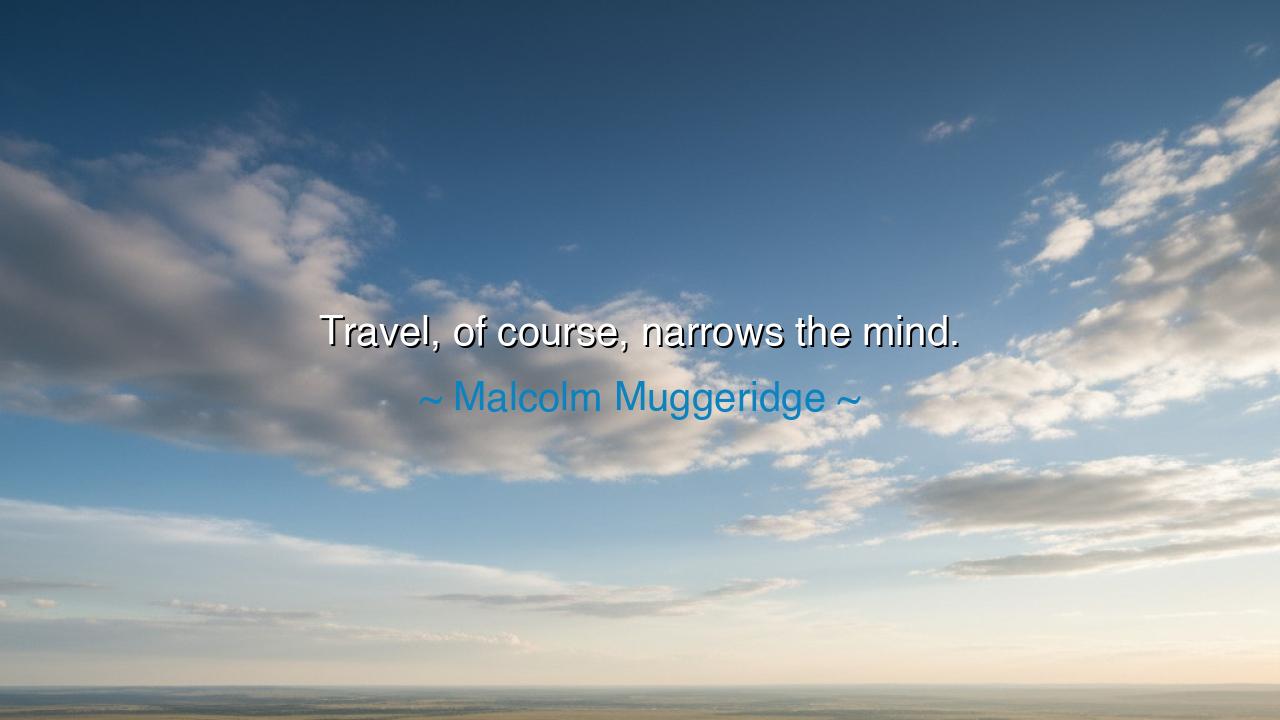
Travel, of course, narrows the mind.






Malcolm Muggeridge, with sharp irony, once declared: “Travel, of course, narrows the mind.” To ears accustomed to hearing the opposite, these words sound like heresy. Do we not say that travel broadens us, that to roam the earth is to expand one’s horizons? And yet, hidden in this paradox lies an ancient warning: that travel, pursued without reflection, can shrink rather than enlarge the soul. For if one journeys only to consume sights, to boast of distances crossed, or to compare all lands against the narrow measure of one’s own pride, then indeed the mind becomes narrower, not greater.
The traveler who goes forth merely to confirm his own prejudices does not grow in wisdom; he ossifies in arrogance. He gazes upon foreign rivers and says, “These are lesser than my own.” He sees strange peoples and calls them “grotesque” or “primitive.” He passes through sacred mountains and temples, yet feels only the weariness of the road and the annoyance of customs different from his own. Such a traveler, instead of expanding, contracts—his mind folded upon itself like a clenched fist. Muggeridge’s words mock this spirit, for he had seen how often travel becomes not revelation but vanity.
The ancients knew this danger. Herodotus, the great historian, roamed far and gathered wonders, yet even he fell prey at times to exaggeration and misjudgment, reporting hearsay as if it were truth. The Roman elites traveled to Greece and Egypt not to honor those cultures, but to plunder their treasures and parade them as trophies in Rome. In their case, travel did not open the mind; it narrowed it to greed and conquest. What should have been reverence turned into appropriation. Muggeridge, in his century, merely reminded us of a truth that history had already whispered.
A story from the Crusades bears witness to this. Knights from Europe traveled thousands of miles to the Holy Land, convinced they carried divine truth. Yet instead of learning from the civilizations they encountered—rich in science, poetry, and philosophy—they rejected what they saw, dismissing it as heresy. Their travel, immense in distance, narrowed their minds, for they closed themselves against the very wisdom they might have received. This is the fate of the traveler who carries no humility: he sees much, but learns nothing.
But let us not despair, for Muggeridge’s saying is not condemnation of all journeys, but a summons to mindful ones. Travel in itself does not narrow or broaden—it is the heart and mind of the traveler that determine the fruit of the road. To wander with humility, to approach each land as a student rather than a judge, to listen more than to speak—this is how the mind is enlarged. To go forth in arrogance, demanding the world conform to one’s expectations—this is how it contracts.
Thus the lesson is clear: travel not as a conqueror of sights but as a pilgrim of wisdom. Let each journey strip away pride, not build it. Let each encounter with difference remind you of your own limits. If you see rivers, listen to their song. If you meet new peoples, honor their customs. If you walk among ancient ruins, let them whisper to you of mortality and humility. In this way, the road becomes not a narrowing corridor, but a wide gate into the soul’s expansion.
Practical action is simple yet profound. When you travel, carry not only your passport and provisions, but also a posture of reverence. Read of the land before you step upon it. Learn a word of its tongue before you greet its people. Ask questions, not to confirm yourself, but to transform yourself. And when you return, do not boast of distances crossed, but of lessons learned. For the true mark of broadening is not the stamps in your book, but the wisdom in your heart.
Thus Malcolm Muggeridge’s paradox resolves into timeless wisdom: Without humility, travel shrinks you; with humility, it redeems you. The choice lies not in the roads beneath your feet, but in the spirit you carry upon them. And so the command to all generations is this: Do not let travel narrow your mind—let it break it open, so that the world may enter and enlarge your soul.






AAdministratorAdministrator
Welcome, honored guests. Please leave a comment, we will respond soon